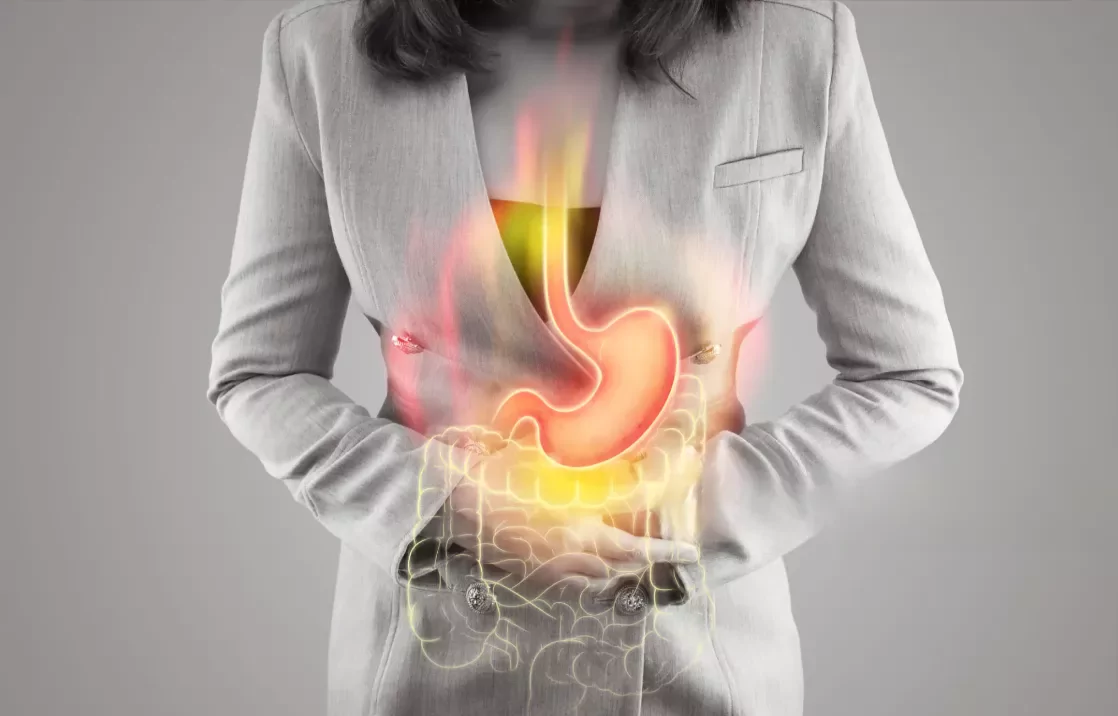
You feel it first in your stomach—tight, fluttery, unsettled
Stress doesn’t stay where it starts. It travels. It lands in the stomach when you least expect it. The gut tightens. Your appetite fades. A small thought spirals into a wave of nausea. You feel full without eating. Or hungry without craving.
The nervous system shifts focus under pressure. Digestion slows to conserve energy. Muscles tighten around the gut. Acids build. Bloating starts.
It’s not food poisoning. It’s not a virus. It’s stress—wrapped in silence and disguised as stomach discomfort.
Your gut responds before you speak. That’s why you feel the twist even before the worry fully forms.
The brain and gut talk constantly—stress changes the entire conversation
Your digestive system is lined with over 100 million nerve cells. It forms its own neural network—the enteric nervous system. This system talks to the brain, listens back, and carries emotions within it.
Stress interrupts that conversation. It introduces noise. The usual rhythm breaks. Transit slows or speeds up. Food lingers too long. Or rushes through too fast.
Some feel cramps. Others feel heaviness. Some get diarrhea. Others feel stuck.
The gut doesn’t just digest. It reacts.
When stress enters the body, the gut speaks back in pain, bloating, and silence.
Cortisol tells the gut to pause everything else
When stress hits, your body produces cortisol. This hormone is designed to protect you. It sharpens focus, increases glucose, and preps the body for action. But it also halts digestion.
Cortisol delays stomach emptying. It increases acid production. It tightens intestinal muscles. Over time, this creates reflux, heartburn, indigestion—even ulcers in extreme cases.
You don’t just feel anxious. You digest like you’re under attack.
The longer the stress stays, the more confused your gut becomes about what’s safe and what’s not.
Stress triggers disorders—or makes them worse
People with IBS, Crohn’s, GERD, or gastroparesis know this too well. Emotional stress doesn’t just trigger flare-ups—it can make them more intense. More frequent. Less predictable.
Even without a formal diagnosis, stress mimics illness. Abdominal pain, bloating, loose stools, urgent bathroom trips—all without a clear medical cause.
What starts in the mind takes shape in the body. Over and over.
The gut stores what the brain can’t release.
Food choices change with emotion—and so does digestion
Stress changes how we eat. Some people stop eating entirely. Others eat nonstop. The meals become erratic. Emotional. Often processed. Often fast.
Comfort food replaces balance. Late-night snacking replaces routine. Eating becomes distraction instead of nourishment.
This affects digestion. Rapid eating causes gas. Poor chewing affects absorption. Skipping meals increases acid buildup.
The body digests what it’s given—but also how it’s given.
And under stress, it’s often given poorly.
The microbiome reacts in silence—but the impact is loud
The gut is home to trillions of bacteria. They regulate inflammation, break down food, and even produce mood chemicals like serotonin. But stress disrupts their balance.
A tense body alters gut motility. Reduces microbial diversity. Weakens the gut barrier. This opens the door to inflammation, food sensitivities, and immune changes.
You may feel bloated after meals that never bothered you. You may react to foods that were once safe.
The gut doesn’t forget. Especially when it’s under pressure.
Long-term stress builds symptoms that don’t fade
When stress becomes chronic, your body adapts—but not in helpful ways. The gut loses its rhythm. Stomach lining thins. Intestinal walls inflame.
Symptoms start stacking. Constipation. Diarrhea. Pain. Bloating. Acid reflux. These become your new normal.
Over time, stress leads to malabsorption. Nutrient loss. Weakened immunity. Fatigue.
It’s not just discomfort—it’s damage. Slowly unfolding over months or years.
Emotional stress shows up physically—then stays
You may think the problem is food. But what if it’s tension? You may cut gluten, dairy, sugar—anything. But the discomfort lingers.
The culprit might not be what you ate—but what you carried emotionally when you ate it.
Stress shifts posture. Breathing. Blood flow. It changes how we sit, how we chew, even how deeply we inhale between bites.
Every meal becomes a reflection of how the nervous system feels.
Gut tension leads to body tension—then back again
The gut is connected to more than just digestion. Tight abdominal muscles affect posture. They contribute to back pain. Shoulder tension. Shallow breathing.
As your body stays locked in stress, your core stays braced. Movement feels off. Even stretching feels restricted.
This creates a feedback loop. Physical discomfort feeds emotional stress. Emotional stress reinforces physical tightness.
The gut doesn’t exist in isolation. It lives in a system that remembers everything.
Real relief begins by calming—not fixing
You don’t need a new diet first. You need a different state.
Deep breathing activates the vagus nerve. That tells the gut it’s safe. Gentle movement—like walking or stretching—stimulates digestion. Mindfulness interrupts the spiral of panic and cramping.
These don’t solve everything. But they start the process.
Because when the mind calms down, the gut often follows.
